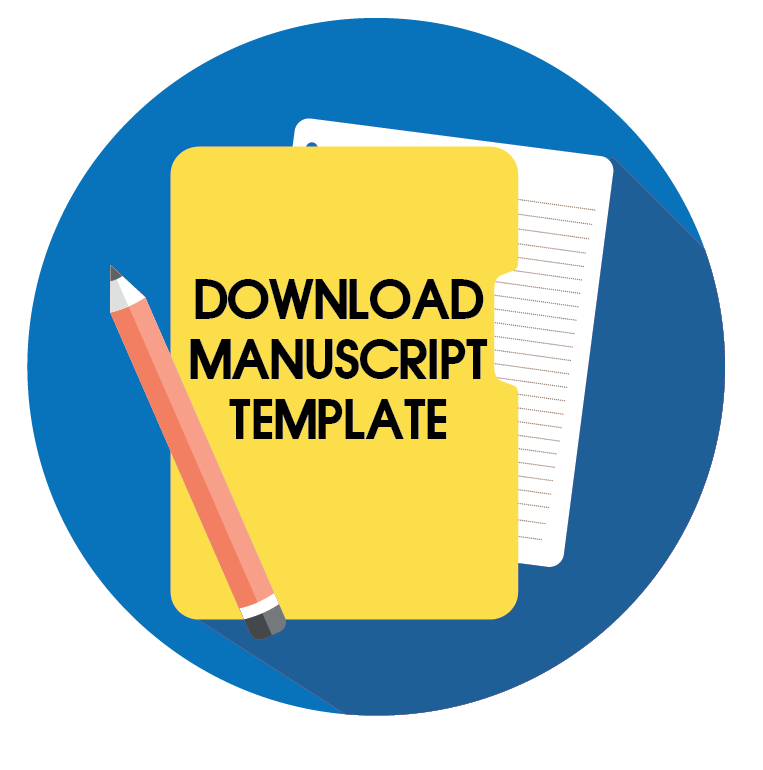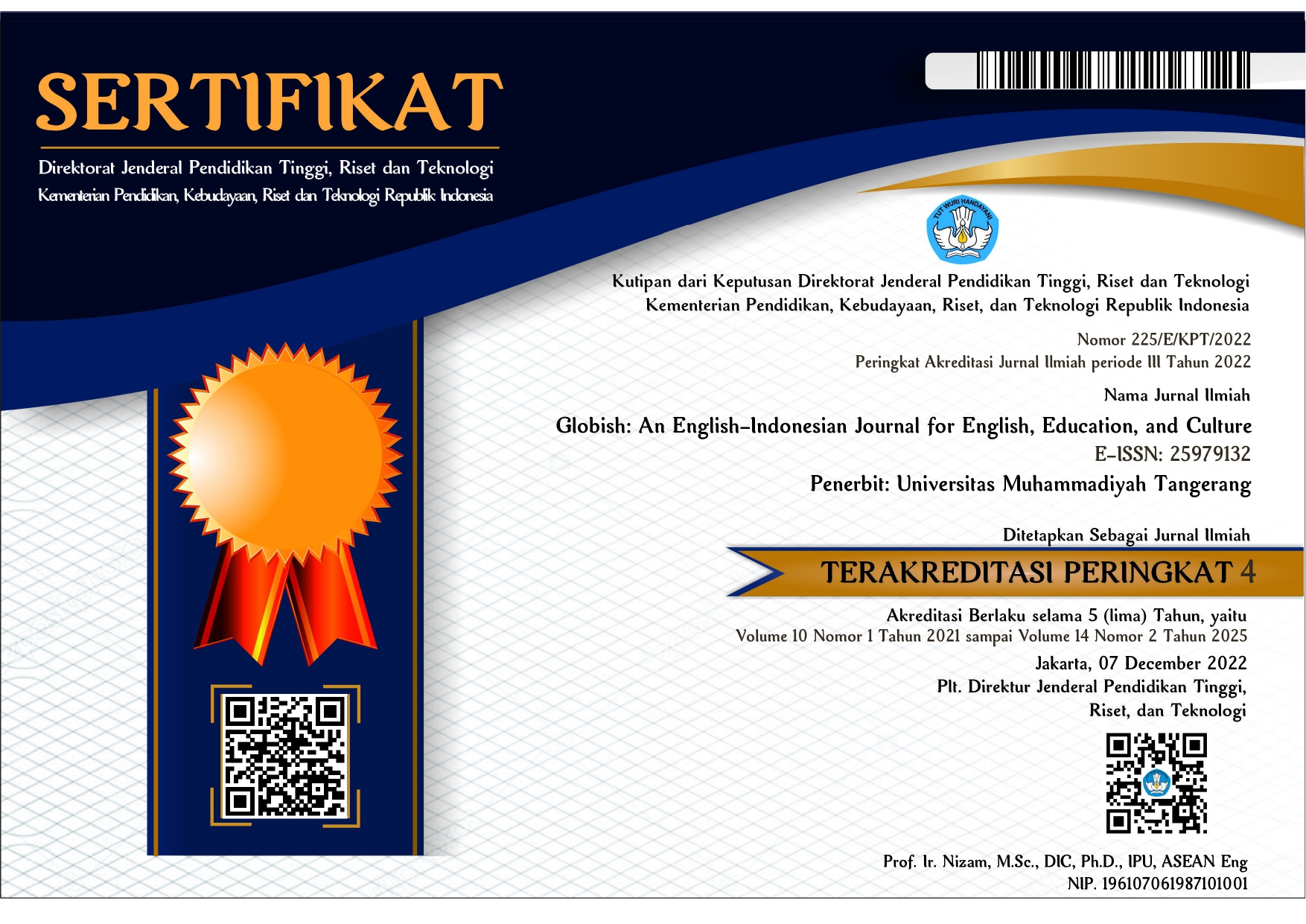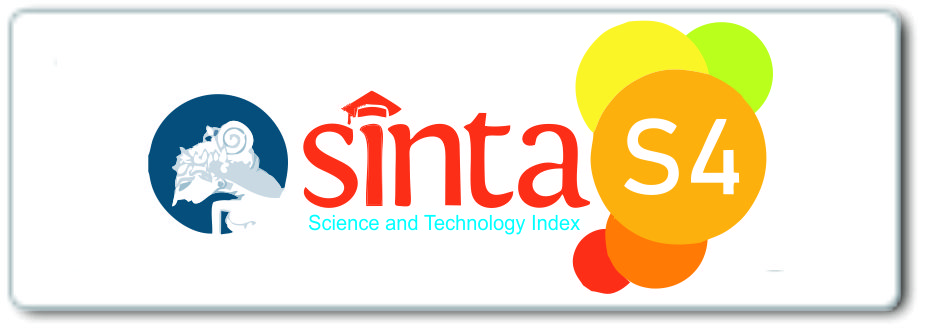A REPORT ON TERTIARY STUDENTS’ SPEAKING ABILITY: A CASE STUDY OF ENGLISH SKILL RELATED TO SPECIFIC COGNITIVE STYLES
Abstract
This study aims to contribute theoretically and practically to the improvement of EFL teaching and learning process. Speaking learning techniques discussed in this research are role play and group discussion. The reason for researcher to use both techniques because both of them expose students to communicate one another so that they are expected to be confident to express their ideas. While the cognitive styles used in this researh as parts of learning style are field dependence and field independence. This research is done to show that besides preparing teaching materials and activities, teachers need to consider the students’ psychological part so that they can help their students optimally. Role play as well as group discussion give significant impact on the students’ speaking ability improvement.
Keywords
Full Text:
PDFReferences
Bailey, K.M., (eds)., 1994.. New Ways in Teaching Speaking. New jersey: Alexandria. VA. TESOL
Brown. D. H. 2001. Teaching by Principles: an interactive approach to language pedagogy. New York: Pearson Education. (2nded.), p.275-276.
Brown. D. J. 2005.Testing in Language Programs: A comprehensive guide to English language assessment. New York: McGraw Hill, p. 186-221.
Burkart. S. G. 1998. Spoken Language: What iIt is and how to teach it. Washington DC:. Center for Applied Linguistics.
Byrne. D. 1987. Techniques for Classroom Interaction. New York: Longman Group. Prentice Hall Inc.
Canale, M., and M. Swain. 1980 in Lazaraton. A. Teaching Oral Skills in Murcia. C. & Mariane. 2001. Teaching English as Second or Foreign Language. New York: Heinle-Heinle, p.104.
Davidoff, S., & Berg, D.V.O. 1990. Why should teachers know about learning styles. From www.best.teaching.com/August 2011/teaching method.
Field. B. 1990. in Heimlich . E. J 1996. P. 44 : The active learning continuum: choosing Activities to engage students in the classroom, Journal of new direction for teaching and learning 67: 3-15
Fraenkel, R.J, & Wallen, E. N .Data Definitions Adapted from the Glossary: How to design and evaluate research in, p.4
Gall, M.D., & Gillet , M. 1980. The discussion method in classroom teaching: Theory into practice New York: Mc Graw Hill, p. 98 -103
Garger.S., & Guild. D. 1987: Learning Style: The Crucial Difference In Clarizio. R.L., Craig & Mehrens. W.A. Contemporary issues in educational psychology (5thed): New York: Random House
Gronlund in Brown. D. H. 2004. Language Assessment: Principle and Classroom Practices. USA: Pearson Education Inc., P.22
Harmer. J. 2011. The Practice of English Language Teaching. Edinburgh: Pearson Education Limited (4thed), p. 344
Harmer. J. 2011. How to Teach English. Edinburgh: Pearson Education Limited (New ed.), p.123
Harris, D. P. Testing English as a Second Language. New York: McGraw-Hill, 1974
Hatch, E. & Farhady. 1982. Research Design and Statistics for Applied Linguistics. London: Newbury house publishers, Inc, pp. 19-22
Keefe. J. W, 1979. Learning Style an overview. In J.W. Keefe (Ed) Student learning styles. Diagnosing and prescribing programs. Reston, VA:. National Association of Secondary School Principal. p. 9
Klippel. F. 2000; Keep Talking - Communicative Fluency Activities for Language. New York: Cambridge University Press
Larsen Diana & Freeman, 2000. Techniques and Principles in Language Teaching. New York:. Oxford University Press
Larson, B. 1997. .Influences on social studies teachers’ use of classroom discussion. Paper presented at the annual meeting of the college and university faculty assembly of the national council for the social studies: Cicinnati, OH.
Lazaraton. in Murcia.C. & Mariane. 2001. A. Teaching Oral Skills, in, Teaching English as second or foreign language. New York: Heinle-Heinle, p.103
Lightfoot. A. 2010. Teaching English group discussion skills: TE editor British Council. India. From British Council – website by bright/emn web design UK
Maghsudi, M. 2007. The interaction between field dependent and field independent learning styles and learner’s linguality in third language acquisition . From: http: imej.wfu.edu/articles/1999/1/10/index.asp.Iran: University Mysore.
McCloskey, M.L. 1990. Integrated Language Teaching Strategies. Atlanta, GA: Educo Press, pp. 4-5.
Messick, S. 1984. The nature of cognitive styles: Problems and promise in educational practice: Educational psychologist, New York:.Bergin and Garvey, pp. 59-74
Murwani, S. R. Dr. Prof. 2011/2012. Statistika Terapan: Teknik Analisis Data. Jakarta: Program Pascasarjana UHAMKA, p. 60
Newman, F. 1990. Higher order thinking in teaching social studies: A rationale for the assessment of classroom thoughtfulness. Journal of curriculum studies, 22, pp. 41 – 46
Nilforooshan, N. & Afghari, A. 2007. The Effect of Field Dependence – Independence as a Source of Variation in EFL Learners’ Writing Performance. Iranian journal of anguage studeies (IJLS), vol. 1 (2), pp. 103-118
Nunan, D. 1989. Designing Tasks for the Communicative Classroom. New York: Cambridge University Press, pp.32-33
Patel, F. M. Dr., & Jain, M. P. 2008. English Language Teaching; Methods, tools & techniques. Jaipur: Sunrise Publishers & distributors, pp. 29
Rahmani. D. B. 2009. The Relationship Between Learning Styles (Field Dependent and Field Independent) and Reading Strategy Altogether Toward Reading Comprehension. Jakarta: Uhamka University
Razal, A. Y., 2009. The provisions of Activities According to the Students’ Learning Styles to Develop Their Speaking Ability. Bandung: UPI Bandung.
Rogers. S. and Evans. J, 2008: In side Role Play in Early Childhood Education-Researching Young Children’s Perspectives. New York: Routledge
Rusli. S. R. & Sugiarto. D. H. 2006. The Effect of Learning Styles to Build Learner Autonomy: TEFLIN journal, vol. 16 (2). Jakarta: Universitas Negeri Jakarta.
Saracho, N. O. 1997. Teachers’ and Students’ Cognitive Styles in Early Childhood Education. New York: Bergin & Garvey.
The National Capital Language Resource Center. Washington, DC/Site Map/ About NCLRC: 2003-2007. Oxford University Press.www.oup.com/elt
Tinajero . C. et.al., 1998. University of Santiago de Compostela: Field Dependence-Independence in Second Language Acquisition: Some Forgotten Aspects. From: The Spanish journal of psychology. Vol. 1 No. 1. 32-38.
Urdan, C. T., 2005. Statistic in plain English (2nd, ed). New Jersey: Lawrence Erlbaum Associates. Inc, p.117
Wyss, R. 2002. Field independent/dependent learning styles and L2 acquisition.The weekly column Article 102. From: journal of ELT, (49), 125 – 128. www.eltnewsletters.com/back/June2002/art 1022002 htm
Witkin. H.A, & Goodenough, D.R 1981: Cognitive Styles, Essence, and Origin. New York: International University Press. PP.59-62
Witkin, H.A, More.C.A.,Goodenough, D.R , and Cox. D.W. 1977: Field Dependence and Field Independence Cognitive Styles and Their Educational implications. Review of Educational Research 47. New York: International University Press. 1-64
Witkin, H.A., Oitman. P.K., Raskin. E. & Karp. S.A., 1971: A Manual for The Embedded Figures Test. Polo Alto, CA: Consulting Psychologist Press.
Wilkinson, I., 2009. Discussion versus recitation: Methods and dimensions: Discussion and student achievement. New York: The Gale Group, Inc. PP.104 – 170.
Wood. G, 2000. How to Study : Discover how your personal learning style can help you succeed . New York: Learning Express. P.111-112
Zhenghui, R. 2001. Matching teaching styles with learning styles in East Asian contexts (online) http://asianefl/journal/2000/raodoc/html.updated on February 11th 2008
DOI: http://dx.doi.org/10.31000/globish.v12i1.7798
Article Metrics
Abstract - 668 PDF - 46Refbacks
- There are currently no refbacks.
Globish
Program Studi Pendidikan Bahasa Inggris
Fakultas Keguruan dan Ilmu Pendidikan
Universitas Muhammadiyah Tangerang
Jl. Perintis Kemerdekaan I/33, Cikokol
Kota Tangerang, Indonesia
e-mail: globish_journal@umt.ac.id
Globish (p-ISSN: 2301-9913 | e-ISSN: 2301-9913) is licensed under a Creative Commons Attribution-ShareAlike 4.0 International License.









